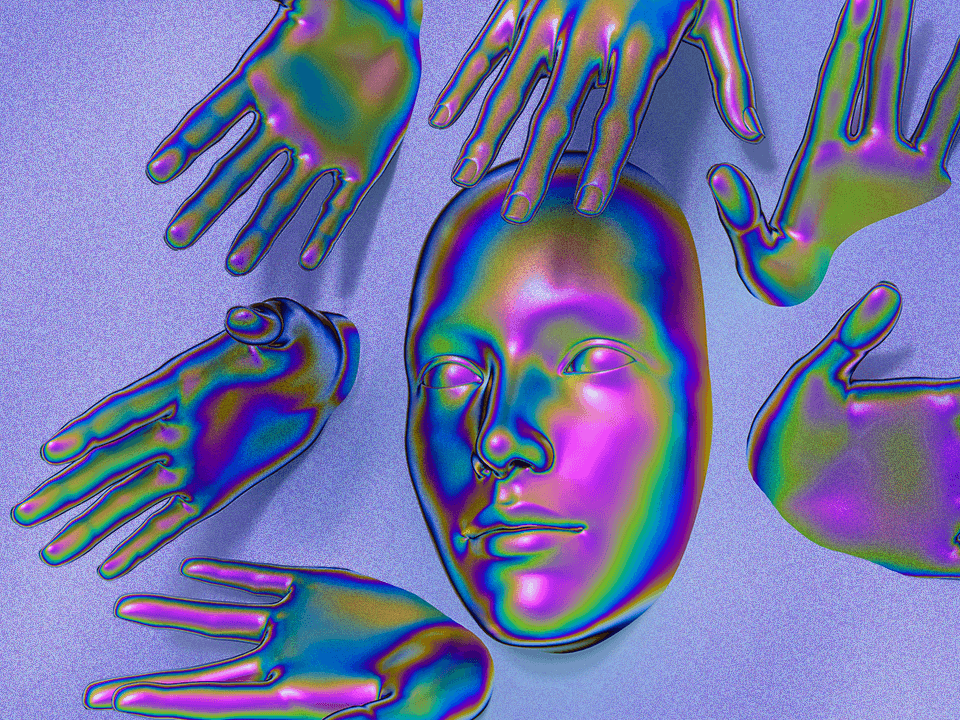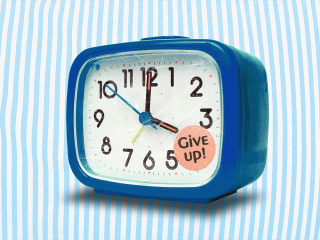7 People on What Psychosis Actually Feels Like
“Most of the time it feels like a glitch in the matrix.”
When psychosis comes up in conversation, it usually starts with something like, “Did you hear about that terrible thing in the news?” and is followed by, “Man, mental health is such a problem in this country.” While, yeah, the latter is sort of true, research shows that people with a psychosis-related disorder are actually more likely to be a victim of a crime than a perpetrator. The reality is that most people who experience psychosis symptoms won’t be featured in dramatic headlines or national tragedies.
That said, psychosis can be a very intense and sometimes scary experience. But it’s one that plenty of people recover from with the help of mental health pros and the right meds. Actually, Selena Gomez (Wondermind’s co-founder and Chief Impact Officer) talked about previously having a psychotic episode in the documentary My Mind & Me.
But even though it’s more common than you’d think—as many as 100 people out of every 100,000 develop psychosis each year, according to the National Institute of Mental Health (NIMH)—the general public’s lack of knowledge about psychosis adds to the stigma, says licensed psychologist Eve Lewandowski, PhD, who works with patients who have psychotic disorders at McLean Hospital and Harvard Medical School.
So, ICYMI, psychosis can be a symptom of mental health disorders like schizophrenia, schizoaffective disorder, bipolar disorder (in manic or depressive episodes), and even PTSD, explains Dr. Lewandowski. Also, psychosis can sometimes happen shortly after people give birth in what's known as "postpartum psychosis," according to the American Psychological Association. It can be a condition in itself or occur due to an underlying mental health condition that started before, during, or after pregnancy.
Psychosis may also happen to people without mental health conditions who are sleep deprived, according to the NIMH. Same goes for some who take medications like stimulants or antidepressants and for those who misuse or withdraw from alcohol or certain substances, notes Dr. Lewandowski.
When psychosis happens, it’s common to see or hear stuff that isn’t there (hallucinations) and/or believe things that aren’t based in reality (delusions), Dr. Lewandowski says. For example, you might think people on TV are trying to warn you that everyone is out to get you. It’s important to take culture, religion, and personal experience into account too, says licensed clinical psychologist Jenny Wang, PhD. So, if you don’t normally hear God speak to you, and you suddenly do, something could be off.
You could also talk in a way that’s hard to understand or jump from one topic to another, according to the Diagnostic and Statistical Manual of Mental Disorders (DSM-5-TR). Plus, those who develop psychosis might isolate themselves, lose interest in things they’re usually game for, or act unusually, Dr. Lewandowski adds.
Psychosis symptoms can last for days, weeks, or even up to a year, especially if they go untreated, says Dr. Lewandowski. But whether or not psychosis is a one-time thing or comes and goes, people can recover from it. With treatment like meds (antipsychotics, for instance), therapy, and outside support, they can “live rich, full lives,” says Dr. Lewandowski.
“Though people like me have experienced really intense mental states, we're just people too,” says Esmé Weijun Wang, author of The Collected Schizophrenias, who’s dealt with psychosis. “It's not something to be afraid of. It's not something to feel like is so alien that we're beyond human or beyond saving,” she adds.
Here, we asked people who’ve been there to share their experiences with psychosis so you can feel less alone or just get a better idea of how they’ve learned to deal.
1. I felt disconnected from the earth.
“Being in psychosis is very overwhelming for me. [As someone with schizoaffective disorder, bipolar type,] I think I've experienced it maybe three to four times within the last several years. And usually when I have an episode, it starts with bizarre thoughts and behaviors. I feel this intense state of fear and feelings of paranoia, like an existential threat or some kind of crisis. Sometimes I lose grip on reality and, most of the time, it feels like a glitch in the matrix, like a disturbance in my mind. So these thoughts make me feel disconnected with reality, ungrounded, and untethered from the earth.
It usually lasts a few days, and, in a worst-case scenario, I end up going to the hospital. But I've been grounded for a few years now.” —Sarah A., 34
2. I felt weird in my body.
“Over time, my psychosis [which is related to schizophrenia] has most definitely changed. It started with being extremely, extremely difficult. It literally felt like I was falling into a pit of despair all the time. I had a lot of fear, anxiety, all that kind of stuff. A lot of sleepless nights, paranoia, the feeling of wanting to jump out of my skin. I couldn't stand being in my tangible body because of how bad it all felt and how much was going through my mind.
[When my psychosis was most extreme,] some of the feelings and thoughts were very, very religious. I believed that I was Jesus Christ and that we were trying to narrow down who the ‘true Jesus’ was. When I was really ill years ago, I had auditory hallucinations, visual hallucinations, and delusions. I couldn’t even focus on anything. There was no ability for me to be living a typical life. I’d just walk down the street, yelling at people, thinking that cars were alive and they were trying to kill me.
I've been taking my antipsychotic for six years and an antidepressant for a while too. I don't feel that anxiety. I don't feel the extreme paranoia that I used to, where I thought people were trying to kill me. I just have moderate thoughts that are kind of paranoid.
If I'm really stressed out, it'll come back a little bit like that, but it won't reach the point where I lose the ability to recognize: OK, this isn't real. Nothing's perfect, right? But you can get to a spot where you do feel like you're living a life that's fulfilling.” —Celia F., 35
3. It was like a bad dream.
“My first hallucinogenic episode happened after I relapsed from alcohol addiction in March 2017. Up until that point, I'd been drinking for about seven years. In that time, I'd gone from drinking one to three glasses of wine per night to two to three bottles a night or sometimes more.
When I stopped drinking abruptly or cut back from what I was drinking too quickly, I would begin to get severe alcohol withdrawal symptoms known as delirium tremens (DTs). This began with the shakes, fever, and nausea usually between 24 and 36 hours after the last drink. After 48 hours, my withdrawals would progress, and I began to hallucinate. It was like I was dreaming while I was awake.
During these episodes, my senses were heightened and everything I saw, heard, and felt was distorted. Typically, I'd see wasps, bats, spiders, and crab-like creatures. They would be terrifying experiences, and I couldn't control my body or easily snap out of these episodes.
I was eventually able to embrace my recovery in November 2019. It inspired me to write Smashed Not Wasted about my experiences.” —Sam T., 37
4. It’s not always scary.
“I feel like psychosis is almost just not believing anything or believing false things, like I can't really trust what's around me because I think everyone's lying to me. I don't believe anybody is telling the truth.
Getting diagnosed with schizophrenia was not a bad thing because then I could finally be treated for the correct illness. I'm on medication, which helps 95% of the time. I'm cool with that. Otherwise, this would happen all the time and I wouldn't be able to leave my house.
I now know how to ignore the really bad voices. I know that they're fake now, but they'll still come in like, 'Why did you just say that? What did you do? Why would you do that? That was stupid. That's why those people don't like you.' It's just like a big ball of self-hate smacking you in the face.
[People who haven’t experienced psychosis might] think, Oh, it's a psychosis episode. It’s scary. It's so frightening. No, it's not frightening. It's not scary. It's not really dangerous for me. It can happen just while sitting on your futon, and you're not going to hurt anybody.” —Michelle H., 35
5. I believed some bizarre things about my family.
“During the pandemic, in December of 2020 to April 2021, was my first major manic episode that turned into psychosis. That's the first time, and only time, I went to a hospital, and that's where I was first diagnosed [with bipolar I]. I didn't have any visual hallucinations or audio hallucinations, but I was convinced my family had always been part of this international criminal organization, and all the evidence I was finding about that explained every detail of my life up to that point.
Nothing has ever felt more true than how that felt to me during that time. I thought I was finding all this evidence online of their criminal activities. I actually took screenshots of Reddit posts of people talking about situations they had been in, where people they knew were part of bad stuff, and, later, after my psychosis, I realized what they said was not what I was reading or seeing at all.
I was building and building this narrative for close to three weeks. I was convinced that people wanted to hurt me because I was figuring this out. And when my family actually came to help me, they asked me to come out to my apartment building’s garage. It's probably 100 feet from the apartment door. I was too scared to do it, so I asked my brother to come get me.
[Once I got to the hospital,] the antipsychotic kicked in, so I was starting to [come back to reality] within three days, but I was still very wary of certain people in my family for maybe another month. Although I didn't believe the full story I had created.” —Brandon C., 30
6. I wasn’t myself.
“I had undiagnosed postpartum depression and anxiety. The week leading up to my actual postpartum psychosis event—which lasted for at least three weeks—I was very much on cloud nine, thinking I was untouchable. The day that I went completely outside of reality, I woke up feeling like the weight of the world was on my shoulders, thinking that God was telling me I needed the prayers of many to tell my story. At that time, I didn't know what story that was. I also did things that morning that were not like myself, including quitting my job.
I spent two or three nights in the psychiatric ER, and I ended up being transferred to an inpatient unit, where I stayed for two weeks. I remember being very scared. I would call my family at least 20 times a day. I do try to find some humor in it [because] I thought that I was on the set of Grey's Anatomy and that other patients were LeBron James and Bradley Cooper.
When I was discharged, I couldn't be by myself. I couldn't be with my kids by myself. I couldn't work and I couldn't drive. That went on for several weeks and I ended up going to an intensive outpatient program. I spent a year [total] recovering. I got off antipsychotics after that year, and I'm still on an antidepressant. I quickly shared my story and started a nonprofit [to advocate for postpartum psychosis awareness].” —Kristina D., 38
7. I felt like I was on a tightrope.
“The first time I experienced a hallucination, it was a voice in my ear that said, ‘I hate you,’ when I was in the shower of my dorm in college. It was so realistic, it was so real, that I could hear it directly in my ear, and I started thinking, Is this something coming from the pipes? Is there something weird going on where a sound is coming through the drain from downstairs or upstairs?
Delusion tends to be more of what I experience these days. One that I've experienced, that I wrote about in my book, The Collected Schizophrenias, was believing that I was dead. Another one that I experienced a lot in my younger years was a delusion where you believe that all of your loved ones are replaced by doubles or robots.
Around 2013 or 2014, when I was diagnosed with schizoaffective disorder, I became quite hopeless, and my doctor told me I had a drug-resistant form of psychosis and schizoaffective disorder, bipolar type. But I ended up [finding meds that have worked for me, which] I've been taking for a number of years. Now, it’s unlikely for me to have a psychotic episode unless I'm under a lot of stress.
I feel like there was a period of time where my mind was much more fragile and I had to be aware of whether or not I was on the verge of having an episode. Now, I'll go through maybe a few weeks where the symptoms are kind of more present—where I have the physical sensation of walking on a tightrope or just standing on a very small square foot of flooring with a very deep and dark abyss around it. For me, there’s a sense of not feeling physically stable in addition to mentally stable. But, for the most part, medication has helped me a lot.” —Esmé W., 39
Quotes have been edited and condensed for length and clarity.
Wondermind does not provide medical advice, diagnosis, or treatment. Any information published on this website or by this brand is not intended as a replacement for medical advice. Always consult a qualified health or mental health professional with any questions or concerns about your mental health.




